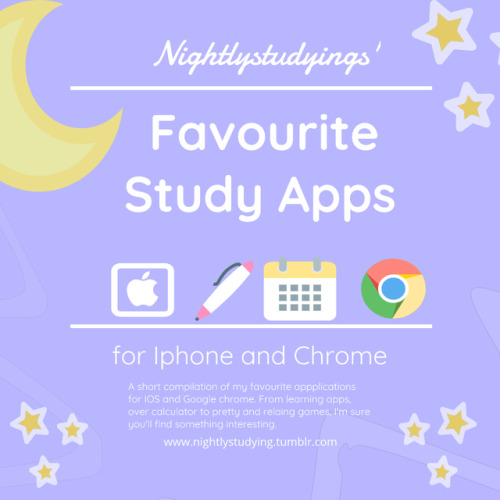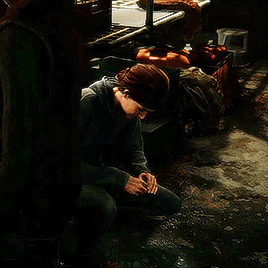PART ONE - IPHONE

PART ONE - IPHONE
So this is my first post that isn’t a stupid text post or overly bright photo of my stationary, so I hope you’ll like it! It will consist of two parts, one for the ios apps and one for google chrome extensions. Feel free to send me recommendations!
bolded = favourite, cursive = apps I use every day
Note taking and co
Pocket - very useful app to save websites, articles, posts etc and read them offline.
Keynote, Pages, Numbers - basics if you have an apple device. I actually like keynote better than powerpoint c:
Notability - Very popular app and it really is worth its money. Great for note taking, especially in class!
Evernote - On my phone for over 4 years now. The group feature is so great and I use it for preparing posts
Werdsmith - very clean and minimalistic app for writing, I use it mainly for creative writing.
Microsoft One Note - Simple app for note taking and making online notebooks.
Languages
Leo - a great dictionary in 8 languages. If you log in you can save problem words and make vocabulary lists.
Memrise - My favourite app to learn languages for free. I’m learning Japanese with it!
Duolingo learning languages for free is always fun and duolingo is so easy to use, it’s even more fun! I use it to practice my Spanish.
Studying
Forest - Who doesn’t know and love forest yet? It’s such a cute application and I use it when I have a long study day/night ahead.
Brainscape - My to go app for flashcards. It has a giant library and it’s easy to make your own. Honestly, I’ve been using it for 3 years now and I still love it.
Mindly - A very beautiful app to make mind maps. I use it for story ideas and school work.
MindNode - also an easy way to make mind maps.
Uberchord - learn how to play the guitar for free c:
TheSimpleClub - videos, and tutorials of all important school subjects, mainly in German, I think
Notenapp - keep track of your grades - German
Khan Academy - like the simple club but with a broader spectrum and in English.
Tide - promodoro app with nice background sounds & inspirational quotes
Swifty - learn how to code in a very fun and simple way!
Flow timer - another great promodoro timer (they are everywhere). I like the minimalistic look and nice colours.
Inspiration & Motivation
Vantage - Simple but beautiful designed calendar
Calm - Helps me calm down with breathing exercises backgrounds and sounds.
Elevate - games and exercises that help to keep your mind fit
Pacifica - an app that helps with anxiety and mental disorders with a very kind community
TED Inspiring, interesting and motivating videos on a wide variety of topics.
Others
Textgrabber & Scanner Pro - Essentials. Scans photos and grabs texts of pdf and other documents and converts them into word/text documents.
Sleeptown - From the makers of forest a very cute app that helps you keep a healthy sleep schedule. I try to use it but I forget it often, sadly.
Tydlig - not free but honestly the best calculator you can have on your phone! Beautiful and simple it makes math so much more fun!
Spark - organizes your emails (even from multiple accounts) and notifies you if something important comes in. Very neat design.
Moon - cute app that shows the phases of the moon depending on the date.
Plant Nanny - keep track of your water intake by watering cute plants (they have something similar for walking and keeping track of expenses!)
More Posts from Popofsy and Others
harry potter gently brushing a stray piece of hair away from draco malfoy’s flushing face. reblog if you agree
“Loving masculinity in a woman differs crucially in one way from loving it in a man: In her it is a badge of standing out, not of fitting in. It is grown into through pain, or at least a sense of separation from those less different.”
— Carol A. Queen, ‘Why I Love Butch Women’, Dagger: On Butch Women
As readers we only know what Harry notices/pays attention to, and although we have no idea what color Cho’s eyes are or what Zacharias Smith’s voice sounds like, we know a lot about Draco Malfoy. Consider. We know:
His hair is blond. But not just blond. It’s a particular, white-blond color that gleams in the sunlight.
And very sleek, but loose enough that it falls around his face if he moves around vigorously enough.
He has grey eyes. Not just grey, but specifically light grey.
Harry also frequently describes them as glittering or sparkling.
He presumably has a sweet tooth as he gets regular sweets packages from home delivered by his eagle owl.
He has very pale skin which takes on a grayish tinge when he’s sickly.
He tends to narrow his eyes when he’s angry.
He doesn’t blush when he’s embarrassed but he does flush - just enough to give his skin a faint pink tinge.
He tends to move his hands a lot when talking animatedly.
His speech has a very specific drawling cadence and tone that makes his voice easily recognizable (to Harry at least).
This is all in canon.
Meanwhile, even though Harry and Ron are together practically 24/7 for seven years, we only find out that Ron’s eyes are blue halfway through Deathly Hallows.
"For someone who has spent the life too busy training with swords, you really know how to provoke men." He squinted at Jude, his voice dry.
She made a point of facing him, narrowing her eyes.
"What do you mean?"
"Make of that what you will." Cardan shrugged with a vague hand gesture, walking towards the bedroom.
"I'll interpret it the hard way then . Or come back here and tell me once and for all what you really think of me. If you have courage."
Cardan turned as if Jude had thrown something at his head.
"What kind of talk is that? Are we going to start a duel?" he asked indignantly.
"Maybe we should." She walked towards him, chin raised to look him in the eye.
"Maybe if you had a knife to your neck you wouldn't play games and just say what you mean."
"Are you threatening me?" He asked with a nervous laugh, raising his eyebrows.
Jude was unbelievable. This wasn't how he imagined wives acted. His wife wasn't like the other girls, though.
"Make of that what you will." She imitated him, her lowered voice still sounding menacing.
My English is terrible but I think that's the best passage I've ever written lol (I hope this doesn't sound like a 5th grade discussion 😭)














THE LAST OF US: part ii mod by Angel-gbc
50 Top Online Learning Sites

Rejoice fellow uni students looking for some studyspo, we urge you to take a few free lessons, as well as academic lessons provided from actual universities on several topics. Have a look at the 50 top learning sites you can find online to help you save some time.
Art and Music
Dave Conservatoire — Dave Conservatoire is an entirely free online music school offering a self-proclaimed “world-class music education for everyone,” and providing video lessons and practice tests.
Drawspace — If you want to learn to draw or improve your technique, Drawspace has free and paid self-study as well as interactive, instructor-led lessons.
Justin Guitar — The Justin Guitar site boasts over 800 free guitar lessons which cover transcribing, scales, arpeggios, ear training, chords, recording tech and guitar gear, and also offers a variety of premium paid mobile apps and content (books/ ebooks, DVDs, downloads).
Math, Data Science and Engineering
Codecademy — Codecademy offers data science and software programming (mostly Web-related) courses for various ages groups, with an in-browser coding console for some offerings.
Stanford Engineering Everywhere — SEE/ Stanford Engineering Everywhere houses engineering (software and otherwise) classes that are free to students and educators, with materials that include course syllabi, lecture videos, homework, exams and more.
Big Data University — Big Data University covers Big Data analysis and data science via free and paid courses developed by teachers and professionals.
Better Explained — BetterExplained offers a big-picture-first approach to learning mathematics — often with visual explanations — whether for high school algebra or college-level calculus, statistics and other related topics.
Design, Web Design/ Development
HOW Design University — How Design University (How U) offers free and paid online lessons on graphic and interactive design, and has opportunities for those who would like to teach.
HTML Dog — HTML Dog is specifically focused on Web development tutorials for HTML, CSS and JavaScript coding skills.
Skillcrush — Skillcrush offers professional web design and development courses aimed at one who is interested in the field, regardless of their background — with short, easy-to-consume modules and a 3-month Career Blueprints to help students focus on their career priorities.
Hack Design — Hack Design, with the help of several dozen designers around the world, has put together a lesson plan of 50 units (each with one or more articles and/or videos) on design for Web, mobile apps and more by curating multiple valuable sources (blogs, books, games, videos, and tutorials) — all free of charge.
General – Children and Adults
Scratch – Imagine, Program, Share — Scratch from MIT is a causal creative learning site for children, which has projects that range from the solar system to paper planes to music synths and more.
Udemy — Udemy hosts mostly paid video tutorials in a wide range of general topics including personal development, design, marketing, lifestyle, photography, software, health, music, language, and more.
E-learning for kids — E-learning for Kids offers elementary school courses for children ages 5-12 that cover curriculum topic including math, science, computer, environment, health, language, life skills and others.
Ed2go — Ed2go aims their “affordable” online learning courses at adults, and partners with over 2,100 colleges and universities to offer this virtual but instructor-led training in multiple categories — with options for instructors who would like to participate.
GCF Learn Free — GCFLearnFree.org is a project of Goodwill Community Foundation and Goodwill Industries, targeting anyone look for modern skills, offering over 1,000 lessons and 125 tutorials available online at anytime, covering technology, computer software, reading, math, work and career and more.
Stack Exchange — StackExchange is one of several dozen Q+A sites covering multiple topics, including Stack Overflow, which is related to computer technology. Ask a targeted question, get answers from professional and enthusiast peers to improve what you already know about a topic.
HippoCampus — HippoCampus combines free video collections on 13 middle school through college subjects from NROC Project, STEMbite, Khan Academy, NM State Learning Games Lab and more, with free accounts for teachers.
Howcast — Howcast hosts casual video tutorials covering general topics on lifestyle, crafts, cooking, entertainment and more.
Memrise — Lessons on the Memrise (sounds like “memorize”) site include languages and other topics, and are presented on the principle that knowledge can be learned with gamification techniques, which reinforce concepts.
SchoolTube — SchoolTube is a video sharing platform for K-12 students and their educators, with registered users representing over 50,000 schools and a site offering of over half a million videos.
Instructables — Instructables is a hybrid learning site, offering free online text and video how-to instructions for mostly physical DIY (do-it-yourself) projects that cover various hands-on crafts, technology, recipes, game play accessories and more. (Costs lie in project materials only.)
creativeLIVE — CreativeLive has an interesting approach to workshops on creative and lifestyle topics (photography, art, music, design, people skills, entreprenurship, etc.), with live access typically offered free and on-demand access requiring purchase.
Do It Yourself — Do It Yourself (DIY) focuses on how-tos primarily for home improvement, with the occasional tips on lifestyle and crafts topics.
Adafruit Learning System — If you’re hooked by the Maker movement and want to learn how to make Arduino-based electronic gadgets, check out the free tutorials at Adafruit Learn site — and buy the necessary electronics kits and supplies from the main site.
Grovo — If you need to learn how to efficiently use a variety of Web applications for work, Grovo has paid (subscription, with free intros) video tutorials on best practices for hundreds of Web sites.
General College and University
edX — The edX site offers free subject matter from top universities, colleges and schools from around the world, including MIT and Harvard, and many courses are “verified,” offering a certificate of completion for a nominal minimum fee.
Cousera — Coursera is a learning site offering courses (free for audit) from over 100 partners — top universities from over 20 countries, as well as non-university partners — with verified certificates as a paid option, plus specializations, which group related courses together in a recommended sequence.
MIT Open Courseware — MIT OpenCourseWare is the project that started the OCW / Open Education Consortium [http://www.oeconsortium.org], launching in 2002 with the full content of 50 real MIT courses available online, and later including most of the MIT course curriculum — all for free — with hundreds of higher ed institutions joining in with their own OCW course materials later.
Open Yale Courses — Open Yale Courses (OYC) are free, open access, non-credit introductory courses recorded in Yale College’s classroom and available online in a number of digital formats.
Open Learning Initiative — Carnegie Mellon University’s (CMU’s) Open Learning Initiative (OLI) is course content (many open and free) intended for both students who want to learn and teachers/ institutions requiring teaching materials.
Khan Academy — Khan Academy is one of the early online learning sites, offering free learning resources for all ages on many subjects, and free tools for teachers and parents to monitor progress and coach students.
MIT Video — MITVideo offers over 12,000 talks/ lecture videos in over 100 channels that include math, architecture and planning, arts, chemistry, biological engineering, robotics, humanities and social sciences, physics and more.
Stanford Online — Stanford Online is a collection of free courses billed as “for anyone, anywhere, anytime” and which includes a wide array of topics that include human rights, language, writing, economics, statistics, physics, engineering, software, chemistry, and more.
Harvard Extension School: Open Learning Initiative — Harvard’s OLI (Open Learning Initiative) offers a selection of free video courses (taken from the edX selection) for the general public that covers a range of typical college topics, includings, Arts, History, Math, Statistics, Computer Science, and more.
Canvas Network — Canvas Network offers mostly free online courses source from numerous colleges and universities, with instructor-led video and text content and certificate options for select programs.
Quantum Physics Made Relatively Simple — Quantum Physics Made Relatively Simple” is, as the name implies, a set of just three lectures (plus intro) very specifically about Quantum Physics, form three presentations given by theoretical physicist Hans Bethe.
Open UW — Open UW is the umbrella initiative of several free online learning projects from the University of Washington, offered by their UW Online division, and including Coursera, edX and other channels.
UC San Diego Podcast Lectures — Podcast USCD, from UC San Diego, is a collection of audio and/or video podcasts of multi-subject university course lectures — some freely available, other only accessible by registered students.
University of the People — University of the People offers tuition-free online courses, with relatively small fees required only for certified degree programs (exam and processing fees).
NovoEd — NovoEd claims a range of mostly free “courses from thought leaders and distinguished professors from top universities,” and makes it possible for today’s participants to be tomorrow’s mentors in future courses.
IT and Software Development
Udacity — Udacity offers courses with paid certification and nanodegrees — with emphasis on skills desired by tech companies in Silicon Valley — mostly based on a monthly subscription, with access to course materials (print, videos) available for free.
Apple Developer Site — Apple Developer Center may be very specific in topics for lessons, but it’s a free source of documentation and tutorials for software developers who want to develop apps for iOS Mobile, Mac OS X desktop, and Safari Web apps.
Google Code — As with Apple Developer Center, Google Code is topic-narrow but a good source of documentation and tutorials for Android app development.
Code.org — Code.org is the home of the “Hour of Code” campaign, which is aimed at teachers and educators as well as students of all ages (4-104) who want to teach or learn, respectively, computer programming and do not know where to start.
Mozilla Developer Network — MDN (Mozilla Developer Network) offers learning resources — including links to offsite guides — and tutorials for Web development in HTML, CSS and JavaScript — whether you’re a beginner or an expert, and even if you’re not using Mozilla’s Firefox Web browser.
Learnable — Learnable by Sitepoint offers paid subscription access to an ebook library of content for computers and tablets, and nearly 5,000 videos lessons (and associated code samples) covering software-related topics – with quizzes and certification available.
Pluralsight — Pluralsight (previously PeepCode) offers paid tech and creative training content (over 3,700 courses and 130K video clips) for individuals, businesses and institutions that covers IT admin, programming, Web development, data visualization — as well as game design, 3D animation, and video editing through a partnership with Digital-Tutors.com, and additional software coding lessons through Codeschool.com.
CodeHS — CodeSchool offers software coding lessons (by subscription) for individuals who want to learn at home, or for students learning in a high school teacher-led class.
Aquent Gymnasium — Gymnasium offers a small but thorough set of free Web-related lesson plans for coding, design and user experience, but filters access by assessing the current knowledge of an enrollee and allows those with scores of at least 70% to continue.
omg at the ellie wardrobe ask this what her closet looks like in my head low-key







omg i wish it looked like this in my head… like she’d look so good 💗 unfortunately this is how i see her dressing 😐






“We’ll present our case to the Council tonight. You did all this yourself?”
CaitVi moments (15/?)
dont let your marks and results determine who you are.
if something bad happened, if you made a mistake or got a bad grade - you will grow, you will evolve. you will be more, and you will be better. you will understand and you will achieve and you will be okay. this does not define you, and this is not the end.
-
 ignoremyressourceshit reblogged this · 5 months ago
ignoremyressourceshit reblogged this · 5 months ago -
 veedarling liked this · 7 months ago
veedarling liked this · 7 months ago -
 izzietooth liked this · 8 months ago
izzietooth liked this · 8 months ago -
 marvelblog123 liked this · 11 months ago
marvelblog123 liked this · 11 months ago -
 decaffeinatedcreationharmony liked this · 1 year ago
decaffeinatedcreationharmony liked this · 1 year ago -
 eastieworld liked this · 1 year ago
eastieworld liked this · 1 year ago -
 dvam289-blog liked this · 1 year ago
dvam289-blog liked this · 1 year ago -
 vakeoikki liked this · 1 year ago
vakeoikki liked this · 1 year ago -
 slaterstudies liked this · 1 year ago
slaterstudies liked this · 1 year ago -
 sapphiccstudies liked this · 1 year ago
sapphiccstudies liked this · 1 year ago -
 staphraffremlaife liked this · 1 year ago
staphraffremlaife liked this · 1 year ago -
 shopmyclothes liked this · 1 year ago
shopmyclothes liked this · 1 year ago -
 thewomaanwhosoldtheworld liked this · 1 year ago
thewomaanwhosoldtheworld liked this · 1 year ago -
 lilacsunsetskies reblogged this · 1 year ago
lilacsunsetskies reblogged this · 1 year ago -
 retiredbrainiac reblogged this · 2 years ago
retiredbrainiac reblogged this · 2 years ago -
 visualiserofvisuals liked this · 2 years ago
visualiserofvisuals liked this · 2 years ago -
 imkindamessy liked this · 2 years ago
imkindamessy liked this · 2 years ago -
 gofrannypack liked this · 2 years ago
gofrannypack liked this · 2 years ago -
 brokebutstillrich liked this · 2 years ago
brokebutstillrich liked this · 2 years ago -
 tirso-en-verso liked this · 2 years ago
tirso-en-verso liked this · 2 years ago -
 prideprcjudice liked this · 2 years ago
prideprcjudice liked this · 2 years ago -
 kingdomhearts6123 reblogged this · 2 years ago
kingdomhearts6123 reblogged this · 2 years ago -
 lostgirl6123 reblogged this · 2 years ago
lostgirl6123 reblogged this · 2 years ago